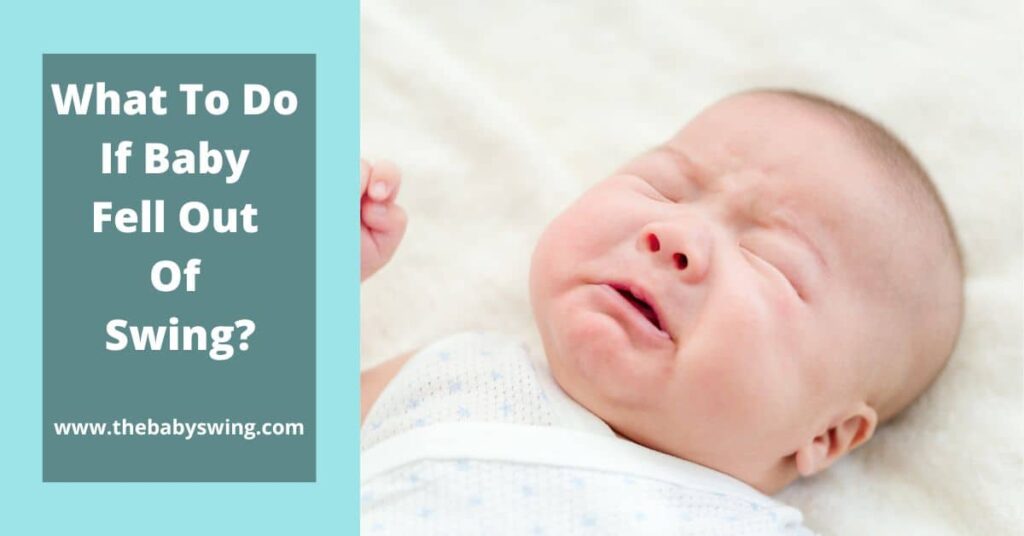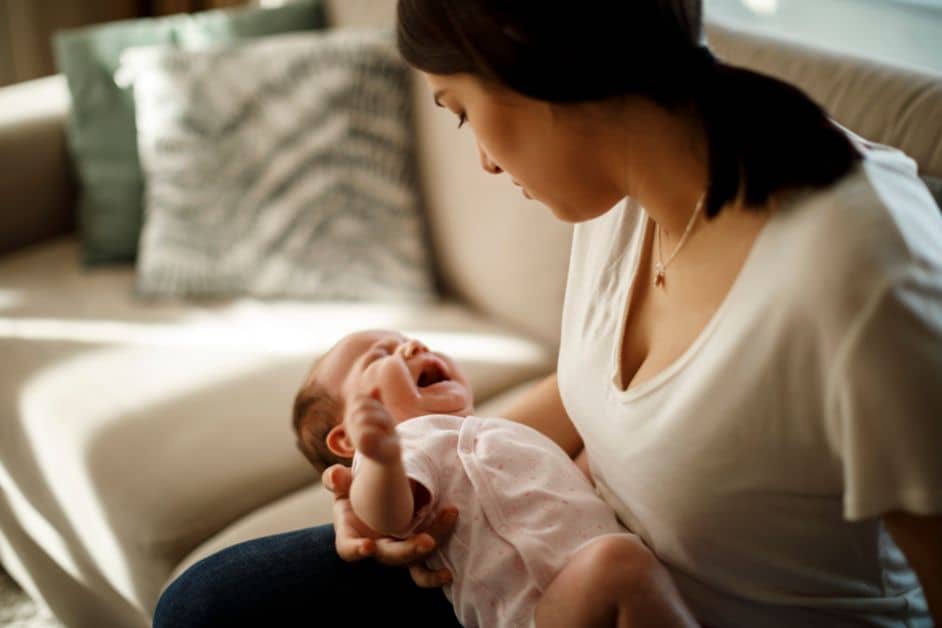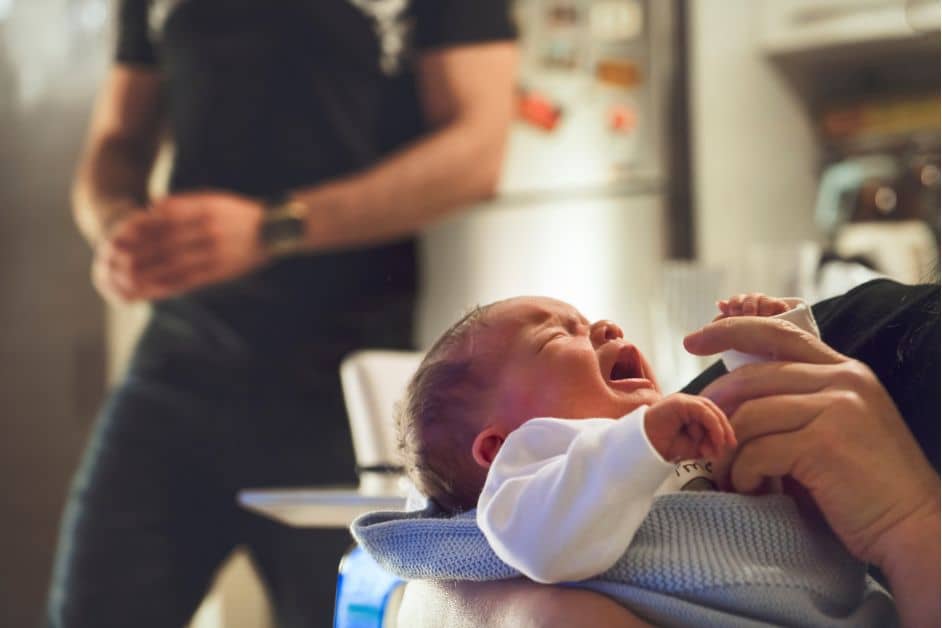Last Updated on July 18, 2023
If your baby falls out of the swing, it can be a scary experience. Many parents don’t know what to do in this situation, so they panic. It is important to stay calm and take the necessary steps to keep your baby safe.
In this blog post, we will discuss what to do if your baby falls out of the swing. We will also provide some tips on how to prevent this from happening in the first place!
- What to do if baby fell out of swing?
- Babies and falls- How to prevent it?
- How do you know if a baby is OK after a fall?
- What to do right after your baby falls out of swing?
- Signs and symptoms of a more serious fall-related injury to look for?
- Can a baby be okay after a fall?
- When should I take my kid to the emergency room?
- What do doctors look for when you bring in a dropped baby?
- Head injuries in children
- Neck, back or spine injuries in children
- Broken bones (or fractures) in children
- Stats on dropped baby injuries
- FAQ baby swing
- Wrapping Up
What to do if baby fell out of swing?

If your child has a fall out of swing, check the baby for bumps and bruises, then move its arms and legs. If a newborn has bumps, bruises, is unresponsive after a fall, or is vomiting or inconsolable, they should see a doctor.
If you aren’t sure of the severity of their injuries, seek emergency care immediately. If you think the injuries may be serious and require specialized care, take them to a pediatric trauma center.
Many baby swings and sleepers have been recalled in recent years due to unfortunate injuries and even deaths. An investigation has shown that these incidents occur when the harnesses are used improperly, causing babies to fall out or be at risk for strangulation.
Babies and falls- How to prevent it?
Falling is one of the most common accidents that can happen to babies. Most falls occur when a baby is trying to walk or crawl. Falls can also happen when a baby is in a high chair, stroller, swing, or crib. There are several things you can do to help prevent your baby from falling.
~Keep an eye on your baby at all times. Do not leave them unattended on an elevated surface, such as a changing table or adult bed.
~At both ends of stairwells, install sliding gates. No accordion-style barriers are suggested since a child’s head could get trapped in the gate. Look for a gate with openings no greater than 5.8 cm (2.3 in.).
~Baby walkers should not be used. They are not a good idea. Because many infants have been severely harmed using baby walkers. Canada has banned them. It is unlawful to produce, market, advertise, or import new or used baby walkers. A stationary activity center with adult supervision is preferable.
~Keep your infant away from elevated porches, decks, and landings.
~Never leave your infant alone in or around a bathtub.
~By removing hazards that might cause a fall, you can make your house safe from falls.
~Use baby gates to block off any areas where your child could fall, such as stairs or rooms with a lot of furniture.
~Careful when carrying your baby. Hold them close to your body and be aware of your surroundings, so you do not trip and fall.
~Use bouncy seats or baby seats for your child.
If your baby does fall, stay calm. Check for any minor injuries and call the doctor if you are concerned. Most falls are not serious and will not cause any long-term damage. However, it is always better to be safe than sorry.
Also read: What age is appropriate for baby swings
How do you know if a baby is OK after a fall?
If the baby is conscious and appears to have no serious injuries, it’s fine to pick them up and soothe them. Check the baby’s entire body thoroughly, including the arms, legs, chest, and back.
Check the common injuries after falling out to ensure is your baby ok or not
~Vomiting.
~Swelling of the soft spot on the head.
~Bruising or swelling along the head, or an obvious skull fracture.
If the fall was from a significant height or the child landed on their head, neck or back, then emergency medical attention may be necessary.
What to do right after your baby falls out of swing?

If the baby falls out of swing, you have to do the following things right after:
– Check the baby’s entire body, paying particular attention to their head for bumps, bruises, or other problems. Examine the arms, legs, chest, and back of the baby.
– If the baby is conscious and does not appear to have any major wounds, it is perfectly acceptable to pick them up and comfort them. To help relieve pain and swelling, apply an ice pack or a cold pack for 15 to 20 minutes to the painful areas.
– You have to remain calm. Otherwise, the baby will sense your anxiety and become more frightened.
– If your baby has more than a minor lump or falls from a height of at least 3 feet, you should go to the emergency department. Otherwise, if you detect any new or continuing symptoms, you should visit a doctor as soon as possible.
– If the baby is bleeding, apply direct pressure to the wound with a clean cloth. If the bleeding is constant and does not stop, then it is best to seek medical attention right away.
– If the baby has a concussion, keep them awake and watch for signs of vomiting, drowsiness, or irritability. If any of these symptoms occur, it is best to seek medical attention right away.
– If the baby has any broken bones, do not try to move them. Instead, immobilize the affected limb with a splint or a sling and seek medical attention right away.
– If the baby stops breathing, start CPR immediately and call 911.
Also read: Can a baby swing go too fast
Signs and symptoms of a more serious fall-related injury to look for?
The Centers for Disease Control and Prevention (CDC) reports that 20% of falls cause serious injuries. Here are some serious signs and symptoms given below.
~Fractured arm.
~Fractured leg.
~Broken wrist.
~Skeletal injuries.
~Concussion.
~TBI( Traumatic Brain injury ).
If you notice any serious injuries, call a doctor immediately.
Can a baby be okay after a fall?
It depends on how severe the fall was and what injuries the baby sustained. If the fall was minor and the baby only had a few bruises, then they would likely be fine.
However, if the fall was more severe and the baby sustained serious injuries, then they may not be okay. It is always best to avoid caution and take your child to the doctor or emergency room after a fall, just to be safe.
However, your baby might appear to be okay after a fall, but you should keep a close eye on them for 24 hours. Injuries may take days or weeks to manifest themselves, so look for any new or worsening symptoms.
When should I take my kid to the emergency room?

Babies are so sensitive because they can not express their feelings. That’s why it might be difficult sometimes to understand them. However, there are some signs and symptoms from which we can understand when the kid needs to be taken to the emergency room. These are:
~Breathing problems.
-~Skull deformity
~Short or long term unconsciousness (this is often the most easily recognized sign, but it’s not extremely common)
~Memory loss surrounding the accident
~Crying that won’t stop
~Worsening of any other symptoms such as confusion, vomiting or weakness
~It’s difficult to rouse oneself suddenly.
~Sight, speech, or mobility are lost all of a sudden.
~A bone protrudes through the skin due to a break.
What do doctors look for when you bring in a dropped baby?
When you get to the hospital with drop baby, your doctor will likely ask you about your baby’s accident. This isn’t to put somebody at fault — it’s to gather important information to determine the extent of the injuries.
~What is the height from which your kid fell?
~What occurred immediately after your baby fell?
~Did your baby lose consciousness during the fall?
~What indications have your baby exhibited in the aftermath of the accident?
~Is there anything else you’d like to know about before or after the injury, or another thing you want us to look out for as we continue working together?
After finding the answer to the above question, if they think there are no obvious signs of injury, they will likely order a CT scan or MRI to check for internal bleeding or other problems.
In most cases, dropped babies will be held for observation in the hospital for a few days to make sure that they are not developing any problems.
Also read: Can newborn sleep in swing at night
Head injuries in children
One of the most common childhood injuries is a head injury, which can occur when a child falls out of a swing. While most head injuries are minor and will heal on their own, some can be more serious and require medical attention.
If your child has fallen out of a swing and hit their head, it’s important to watch for signs of a more serious injury. These can include
~Dizziness.
~Nausea.
~Vomiting.
~headache.
~Blurred vision.
If your child is displaying any of these symptoms, or if they seem to be in pain, it’s best to seek medical attention right away.
In most cases, head injuries from falling out of swings are minor and will heal with time. However, it’s important to watch for any signs of a more serious injury and to seek medical attention if necessary. With proper care and treatment, most children will make a full recovery from a head injury sustained in a fall from a swing.
Neck, back or spine injuries in children
While most children will suffer only minor injuries from falling out of a swing, some may sustain more serious neck, back or spine injuries. In rare cases, these types of injuries can even be life-threatening. Here are some signs and symptoms of neck, back or spine injuries in children ~Muscle weakness.
~Inability to voluntarily move chest, arm, or leg muscles.
~Breathing problems.
~Loss of feeling in the chest, arms, legs, or buttocks.
~Loss of bowel and bladder function.
~ Poor blood pressure control, sweating, shivering, and abnormal function of the stomach and intestines (abnormal autonomic regulation).
If your child has fallen out of a swing and shows the above symptoms, it is important to seek medical attention right away.
Also read: Are baby swings good for newborns
Broken bones (or fractures) in children
Broken bone (or fracture ) is a medical condition where the continuity of the bone is broken. They are commonly found in children due to their still-developing bones. However, most fractures will heal well with no long-term issues. Treatment usually involves using a splint or cast (full or partial) to restrict movement until the bone mends itself.
Fell out of swing is one of the reasons to broken bones in children. If you suspect your child has a fracture, here are some possible symptoms to watch for.
~There are a variety of factors that can lead to persistent pain or tenderness at the injury site.
~Swelling or redness around the accident.
~Injured area deformation (unusual form).
~Not wanting to use or move the injured area.
On rare occasions, the force of an injury can cause the skin over a fracture to split – this is called a compound fracture. There may only be a small break in the skin (the bone may not be sticking out of the wound). If this has occurred, it is important to see your GP or go to your local hospital emergency department.
Sometimes children will not have any of the above symptoms and a fracture may not be noticeable even if an injury has occurred.
Stats on dropped baby injuries
There are many potential risks associated with dropping a baby, even if the fall is from a short distance. Some of the most common injuries that can occur include:
-Skull fractures
-Bleeding in the brain
-Broken bones
-Internal bleeding
-Damage to vital organs.
In some cases, 97 percent of these falls/drops babies experienced head injuries. Visible wounds (ones that you can see) occurred in 14%. Bruises made up the remaining 56%. Less than one percent of falls resulted in a concussion or fracture.
According to another study, the mortality rate for dropped infants is about 1 in 1,000. This means that for every 1,000 babies who are dropped, one will die as a result. While this may seem like a small number, it is still important to be aware of the potential dangers associated with this type of accident.
FAQ baby swing
Are babies skulls hard?
When a baby is born, their skull is soft. The pieces of their skull aren’t joined together yet, allowing them to pass through the birth canal easily. When your baby is born, you may see a subtle indentation on the top of their head. It can take up to 18 months for the skull to fully form and harden.
A newborn baby’s skull was found to withstand forces of up to 1000 N before breaking in during an experiment on a biopsy. Even so, the fracture lines ran along bony spikes (spiculae) from the ossification centers of the skull bones).
On the other hand, a newborn’s softer, more malleable skull exposes the brain to a greater risk of damage and injury. If a fracture occurs, it has the potential to do extra harm and injury.
How can you tell if a baby has a skull fracture?
If your baby has a head injury, it’s important to watch for signs of a skull fracture.
~A lump or dent on the head.
~Bruising or swelling on the head.
~Headache.
~Confusion or disorientation.
~Dizziness.
~Nausea or vomiting.
~Loss of consciousness.
~Clear fluid or blood running from the nose or ears.
You may also notice that your baby is more irritable than usual or has difficulty sleeping. If you have any concerns, be sure to talk to your doctor.
What are the symptoms of a slow brain bleed?
When more blood reaches your brain or the limited area between your brain and skull, other symptoms and signs may emerge, such as:
~Headache.
~Back or neck discomfort.
~Neck stiffness.
~Vision disorders.
~Photophobia (sensitivity to light).
~Face or bodily weakness on one side.
~Slurred speech.
~Lethargy.
~Nausea and vomiting
~Seizures
~Loss of consciousness
If you experience any of these symptoms, it is important to seek medical attention immediately. A slow brain bleed can be fatal if left untreated.
Wrapping Up
Falling is a common occurrence, especially for babies who are just learning to walk or crawl. Most falls are not serious, but it is always better to be safe than sorry. You can do several things to help prevent your baby from falling, such as keeping an eye on them at all times and removing hazards from your home. If your baby does fall, stay calm and check for any minor injuries. If you are concerned, call the doctor.
Please share this blog post with other parents to help keep their babies safe!
References:
- https://www.medicalnewstoday.com/articles/322208
- https://www.healthpartners.com/blog/what-to-do-if-your-child-is-injured-after-a-fall/
- https://health.clevelandclinic.org/what-to-do-if-your-infant-falls-off-the-bed-or-changing-table/
- https://www.webmd.com/parenting/baby/what-to-do-when-baby-falls
- https://www.cdc.gov/falls/facts.html
- https://www.nia.nih.gov/health/prevent-falls-and-fractures

Dr. Leah Alexander is a board-certified general pediatrician who has been in practice for over 20 years. She began working as a pediatrician at Elizabeth Pediatric Group of New Jersey in 2000. Since 2005, she has been working as an independently contracted pediatrician with Medical Doctors Associates at Pediatricare Associates of New Jersey. Read more
